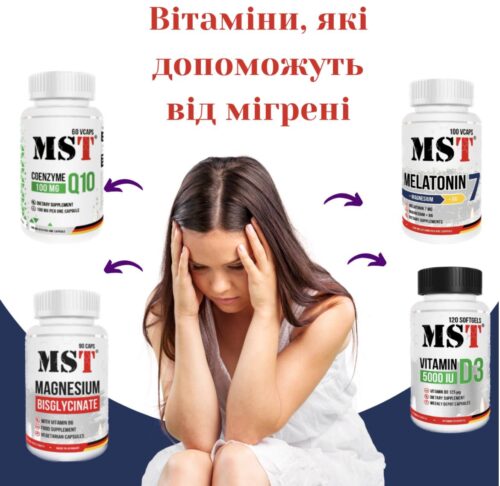

“Migraine” is a condition characterized by recurrent attacks of severe headaches, which can be accompanied by other symptoms such as nausea, vomiting, and sensitivity to light. The pain during a migraine often pulsates and ranges from moderate to severe. It may occur on one or both sides of the head. Migraine headaches can last from 4 to 72 hours. Studies estimate that over 20% of women and 10% of men experience migraines at some point in their lives. There is scientific evidence indicating that migraines have a genetic basis. Episodes of migraines can occur without any specific trigger or can be triggered by dehydration, stress, and even diet.
Many studies suggest that the use of vitamins and minerals may help manage pain better than analgesic medications.
Here’s the translation of the text into English:
MST® B Vitamins
Specifically, vitamin B2 (riboflavin) plays a role in many metabolic processes. This water-soluble vitamin can play an important role in processes that prevent the development of migraines.
For example, migraine episodes are believed to be associated with oxidative stress and brain inflammation. Oxidative stress is a condition of imbalance between free radicals and antioxidants in the body, which can lead to inflammatory reactions.
Magnesium
MST® Liquid Magnesium Citrate
MST® Magnesium CHELAT + Vitamin B6 Magnesium Chelate + Vitamin B
Magnesium is a key mineral essential for supporting nervous system function, blood pressure, and muscle function. Deficiency in magnesium is linked to mild to moderate headaches and migraines. Consequently, magnesium is considered to play an important role in prevention and treatment. Magnesium can help prevent excessive activation of brain cell receptors and reduce inflammatory signals associated with migraine development. According to studies, magnesium supplements may be particularly effective in treating premenstrual headaches associated with migraines in women.
Vitamin D3
MST® Vitamin D3 – 5000 IU Vitamin D3
Vitamin D deficiency is also linked to migraines. Additionally, vitamin D may improve magnesium absorption and reduce the production of substances that increase during migraine attacks. Taking vitamin D supplements can help prevent and aid in the treatment of migraine attacks, especially in people with vitamin D deficiency.
Coenzyme Q10
MST® Coenzyme Q10 100 mg
Coenzyme Q10 is a vitamin-like compound that has antioxidant effects on the body. As an antioxidant, it can protect against oxidative stress associated with migraines. Coenzyme Q10 can also reduce the level of enzymes that increase during migraine attacks and lead to nerve inflammation. Therefore, coenzyme Q10 can help in the treatment of migraines.
Melatonin
MST® Melatonin 7 + Magnesium B6
MST® Melatonin 4 + Magnesium B6
Melatonin is a hormone produced by the pineal gland in your brain at night, which helps you fall asleep. The development of headaches and migraine episodes may be associated with anomalies related to the pineal gland, leading to low melatonin levels.
Taking melatonin can help prevent migraine attacks and protect the brain from toxic molecules by regulating neurotransmitters and alleviating pain.
If you have any further questions or need more information, feel free to ask!





